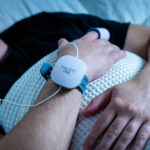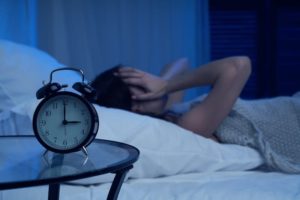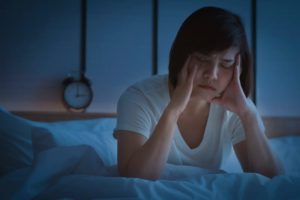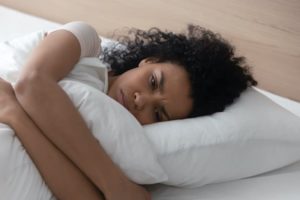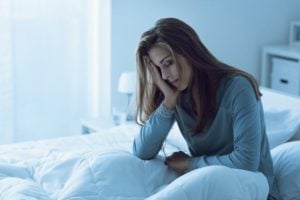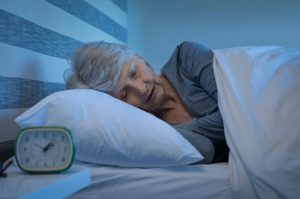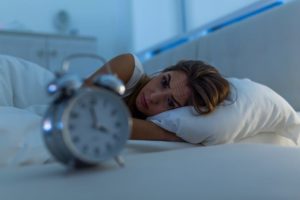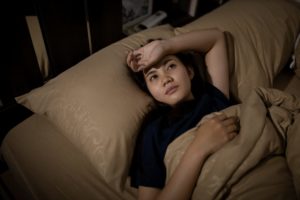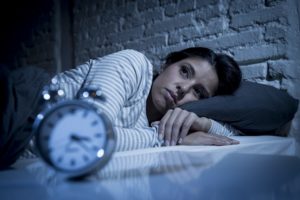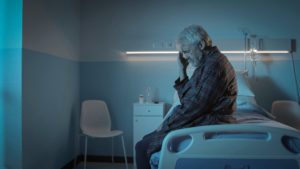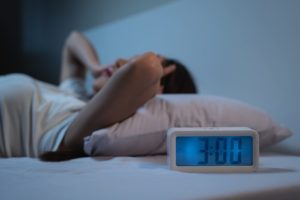When you buy through our links, we may earn a commission. Products or services may be offered by an affiliated entity. Learn more.
Paradoxical Insomnia: The Misperception of Your Sleep State
- Paradoxical insomnia is a sleep disorder where individuals believe they are sleep-deprived despite having a normal sleep cycle.
- People with paradoxical insomnia experience distress, anxiety, and fatigue.
- What causes paradoxical insomnia is still unclear, but brain activity during sleep may play a role.
- Diagnosis and treatment involves a sleep study and guidance from a sleep specialist to improve sleep quality.
Sleep is a complex process, and sometimes our perception of how well we sleep — or even whether we are asleep or awake — can be incorrect.
Insomnia is a sleep disorder involving persistent difficulty with sleep onset, duration, or quality. Paradoxical insomnia, on the other hand, is named after its central paradox, which is that people with this condition believe they have stayed awake for most of the night despite sleeping for close to a normal length of time.
While paradoxical insomnia is an understudied disorder, ongoing research into its causes has begun to shed light on this condition and its potential treatments.
Struggling to Stay Awake? Take an At-Home Sleep Test
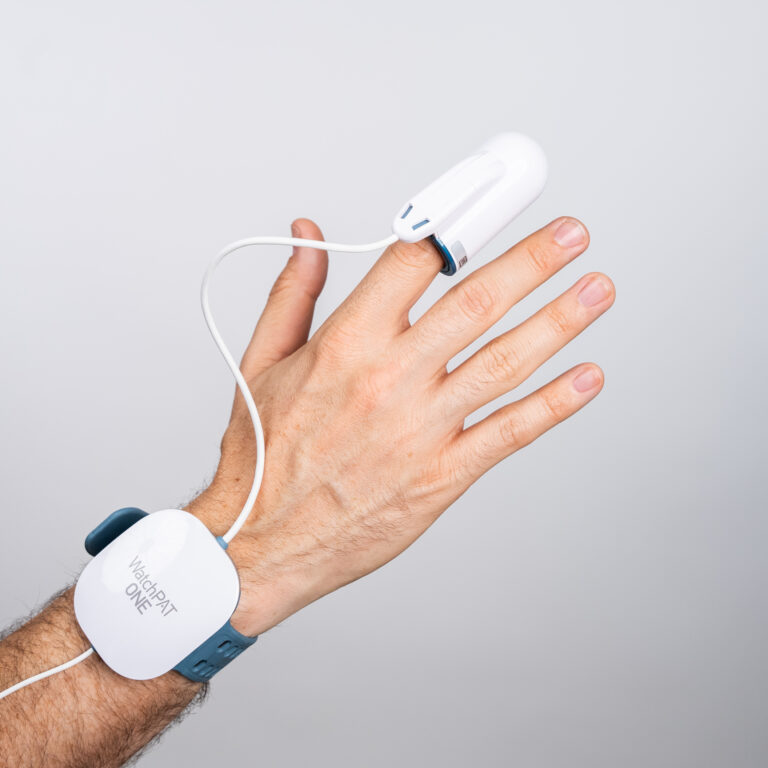
our partner at sleepdoctor.com
10% off Home Sleep Tests
Buy Now“Truly grateful for this home sleep test. Fair pricing and improved my sleep!”
Dawn G. – Verified Tester
What Is Paradoxical Insomnia?
Formerly known as sleep state misperception, paradoxical insomnia is a sleep disorder that causes people to feel awake even while they are asleep, leading them to underestimate how many hours they sleep each night. People with this disorder can feel as though they have barely slept at all despite sleeping for a relatively normal length of time.
The study of paradoxical insomnia has been hindered by a lack of consensus on the quantitative definitions of objective versus subjective sleep duration. One review found that the prevalence of paradoxical insomnia ranged from 8% to 66% depending on the parameters used in sleep studies, making it difficult to estimate its rarity.
People with insomnia — sometimes referred to as objective insomnia in clinical settings — often experience a discrepancy between their perception of sleep duration and the amount of time they were actually asleep, but the difference between subjective and actual sleep duration is particularly marked in people with paradoxical insomnia. Despite sleeping for a relatively average length of time and experiencing limited daytime impairment, people with this condition report many of the same symptoms as those with objective insomnia.
Paradoxical insomnia also appears to raise stress levels to a similar degree as objective insomnia.
Paradoxical Insomnia vs. Paradoxical Sleep
While the two terms may appear related, paradoxical sleep refers to the rapid eye movement (REM) sleep stage rather than a disorder like paradoxical insomnia.
REM sleep is the stage of sleep when most dreams occur. Sleep experts sometimes refer to REM sleep as paradoxical sleep because the brain is highly active while the body is asleep.
What Causes Paradoxical Insomnia?
Experts are unsure of what causes paradoxical insomnia, though there are several lines of inquiry that may yield answers.
Studies show that paradoxical insomnia may be related to specific personality traits, such as neuroticism. The correlation may be due to people with these traits having a tendency toward anxiety and higher arousal levels, but research into the connection is ongoing.
Another theory is that paradoxical insomnia may be caused by differences in the neural structure of sleep that are unable to be detected by current methods. Compared to both people without insomnia and people with objective insomnia, studies show that those with paradoxical insomnia display altered brain activity indicative of arousal during sleep.
Paradoxical Insomnia and Other Disorders
Paradoxical insomnia may occur alongside other disorders, both sleep-related and otherwise.
- Obstructive sleep apnea: People with obstructive sleep apnea (OSA), a sleep breathing disorder, have been found to be more likely than those without OSA to overestimate or underestimate the length of their sleep.
- Depression: Although insomnia is a common symptom of depression, some people with major depressive disorder may also experience a discrepancy between their subjective and objective sleep length.
- Post-traumatic stress disorder: While an estimated 70% of people with post-traumatic stress disorder (PTSD) experience insomnia, studies have shown little difference in the sleep of people with PTSD versus a control group, indicating that paradoxical insomnia may play a role in PTSD-related sleep difficulty.
- Irritable bowel syndrome: Research suggests that people with irritable bowel syndrome may be more likely to underestimate how long they sleep.
Symptoms of Paradoxical Insomnia
People with paradoxical insomnia report feeling aware of their surroundings at night and sleeping for only a few hours each night, if at all, despite objectively sleeping for long enough to avoid sleep deprivation symptoms.
Another potential symptom of paradoxical insomnia is experiencing sleeplessness without significant impairment the next day. However, some people with the disorder do report feeling daytime fatigue. Paradoxical insomnia may also cause sleep disturbances over time due to the distress caused by the perceived lack of sleep.
How Is Paradoxical Insomnia Diagnosed?
Since a diagnosis of paradoxical insomnia requires confirmation that someone is sleeping when they think they are awake, the diagnosis is usually made after a sleep study. Also known as polysomnography, a sleep study allows doctors to objectively confirm when a person is asleep or awake, which can then be compared against their self-reported sleep length.
It is also possible to diagnose paradoxical insomnia using actigraphy, a form of sleep analysis that involves wearing a wristwatch-style device while at home.
However, paradoxical insomnia is considered difficult to diagnose. A patient who reports experiencing insomnia is not usually given a sleep study unless they are unresponsive to treatment or their doctor believes they have other sleep disturbances. People are only diagnosed with paradoxical insomnia if they do not have another mental or physical reason for misjudging their sleep.
Treatments for Paradoxical Insomnia
While there is no standard treatment protocol for paradoxical insomnia, there are a number of potential treatment options. People who suspect they have paradoxical insomnia should speak with their medical provider, as they will be able to prescribe the most appropriate treatment once they have made a diagnosis.
Medications, including sedatives and antipsychotics, have been used to treat paradoxical insomnia. However, they may have side effects, and there is a lack of clinical consensus regarding their effectiveness.
Other treatments for paradoxical insomnia include sleep education and guidance in sleep hygiene and relaxation techniques. Sleep education is sometimes provided in conjunction with a sleep study, in which the study participant and a doctor review the results and discuss the discrepancy between perceived and actual sleep duration.
Another treatment option is cognitive behavioral therapy, which uses a combination of therapeutic techniques to identify negative thought patterns and behaviors and replace them with helpful alternatives. Studies focused on the use of cognitive behavioral therapy for people with insomnia indicate that it can improve both sleep quality and perceived sleep length, making it a potentially useful treatment for paradoxical insomnia as well.

Still have questions? Ask our community!
Join our Sleep Care Community — a trusted hub of sleep health professionals, product specialists, and people just like you. Whether you need expert sleep advice for your insomnia or you’re searching for the perfect mattress, we’ve got you covered. Get personalized guidance from the experts who know sleep best.
References
11 Sources
-
American Academy of Sleep Medicine. (2014). The International Classification of Sleep Disorders – Third Edition (ICSD-3). Darien, IL.
https://aasm.org/ -
Rezaie, L., Fobian, A. D., McCall, W. V., & Khazaie, H. (2018). Paradoxical insomnia and subjective-objective sleep discrepancy: A review. Sleep Medicine Reviews, 40, 196–202.
https://pubmed.ncbi.nlm.nih.gov/29402512/ -
Castelnovo, A., Ferri, R., Punjabi, N. M., Castronovo, V., Garbazza, C., Zucconi, M., Ferini-Strambi, L., & Manconi, M. (2019). The paradox of paradoxical insomnia: A theoretical review towards a unifying evidence-based definition. Sleep Medicine Reviews, 44, 70–82.
https://pubmed.ncbi.nlm.nih.gov/30731262/ -
Martucci, M., Conte, M., Ostan, R., Chiariello, A., Miele, F., Franceschi, C., Salvioli, S., Santoro, A., & Provini, F. (2020). Both objective and paradoxical insomnia elicit a stress response involving mitokine production. Aging, 12(11), 10497–10505.
https://pubmed.ncbi.nlm.nih.gov/32420904/ -
Geyer, J. D., Lichstein, K. L., Ruiter, M. E., Ward, L. C., Carney, P. R., & Dillard, S. C. (2011). Sleep education for paradoxical insomnia. Behavioral Sleep Medicine, 9(4), 266–272.
https://pubmed.ncbi.nlm.nih.gov/22003980/ -
NCI Dictionary of Cancer Terms. (n.d.). National Cancer Institute., Retrieved April 1, 2022, from
https://www.cancer.gov/publications/dictionaries/cancer-terms/def/rapid-eye-movement-sleep -
Siegel, J. M. (2011). REM sleep: A biological and psychological paradox. Sleep Medicine Reviews, 15(3), 139–142.
https://pubmed.ncbi.nlm.nih.gov/21482156/ -
Sánchez-Ortuño, M. M., Edinger, J. D., & Wyatt, J. K. (2011). Daytime symptom patterns in insomnia sufferers: Is there evidence for subtyping insomnia? Journal of Sleep Research, 20(3), 425–433.
https://pubmed.ncbi.nlm.nih.gov/21205038/ -
Martin, J. L., & Hakim, A. D. (2011). Wrist actigraphy. Chest, 139(6), 1514–1527.
https://pubmed.ncbi.nlm.nih.gov/21652563/ -
Wong, S., & Ng, B. (2015). Review of sleep studies of patients with chronic insomnia at a sleep disorder unit. Singapore Medical Journal, 56(6), 317–323.
https://pubmed.ncbi.nlm.nih.gov/26106238/ -
Wenzel, A. (2017). Basic strategies of cognitive behavioral therapy. Psychiatric Clinics of North America, 40(4), 597–609.
https://pubmed.ncbi.nlm.nih.gov/29080588/



